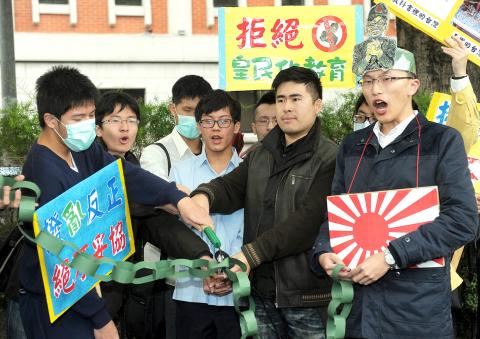A group of high-school students and young China-centered history advocates yesterday said they supported the changes the Ministry of Education (MOE) has proposed for the high-school history curriculum and urged it to stand firm against opposing views.
Following a wave of protests against the adjustments by history professors and students, political figures and high-school teachers over the past two weeks, a dozen young people, referring to themselves as the Anti-Independence-Oriented-History Front, yesterday defended the ministry.
Comprised of the Alliance of Students Safeguarding the Nation’s History, the New Youth Justice Alliance and the Association of New Chinese Children, the Front members raised banners that read: “No compromise to bringing order to chaos” and “Say No to Kominka education” in front of the ministry building in Taipei.

Photo: CNA
The Kominka movement refers to the Japanese endeavor during the Japanese colonial period to make Taiwanese loyal subjects of the emperor.
People at the rally said that the ministry’s adjustments were only to “justifiably have history written more in line with the Republic of China (ROC) Constitution” and said that they are people of ROC, not Japan’s imperial subjects.
Hou Han-ting (侯漢廷), a graduate political science student at National Taiwan University and the head of the school’s China Rise Club, said the textbook was “the execution of the will of the state” and so should teach history from the ROC’s point of view rather than from a Taiwanese independence viewpoint.
“The adjustments are only small changes to bring order to the chaos [incurred by the Democratic Progressive Party administration during its eight years in power],” Hou said.
“What’s wrong with telling the truth about Taiwanese history of Japanese persecuting Taiwanese and forcing some to become comfort women?” Hou added.
Chinese Culture University history graduate student Lin Ming-cheng (林明正) criticized the current textbook for introducing Taiwanese temples that enshrine Japanese police from the Japanese colonial period.
Lin showed pictures of Tainan City’s temples enshrining Koxinga (國姓爺) for “the re-conquest of Taiwan” and academic and bureaucrat Lin Zexu’s (林則徐) action against opium in 1838, pointing out that these cases indicated “the real Taiwanese society has a China-centered view of history.”
New Chinese Children Association head Wang Puchen (王炳忠) said critics who accused the MOE of acting to “de-Taiwanize” the nation had “blemished” the government’s effort, adding that the changes are not to devalue Taiwan, but to get rid of Kominka thinking.
“Real Taiwanese history can be seen as the history of modern China being encroached by colonial empires,” Wang said, adding that localization is not equal to Taiwanese independence.
Hou, Lin and Wang were the leaders of the movements supporting pro-China Want Want China Times Group in last year's media monopolization controversy.

ANOTHER EMERGES: The CWA yesterday said this year’s fourth storm of the typhoon season had formed in the South China Sea, but was not expected to affect Taiwan Tropical Storm Gaemi has intensified slightly as it heads toward Taiwan, where it is expected to affect the country in the coming days, the Central Weather Administration (CWA) said yesterday. As of 8am yesterday, the 120km-radius storm was 800km southeast of Oluanpi (鵝鑾鼻), Taiwan’s southernmost tip, moving at 9kph northwest, the agency said. A sea warning for Gaemi could be issued tonight at the earliest, it said, adding that the storm is projected to be closest to Taiwan on Wednesday or Thursday. Gaemi’s potential effect on Taiwan remains unclear, as that would depend on its direction, radius and intensity, forecasters said. Former Weather Forecast

As COVID-19 cases in Japan have been increasing for 10 consecutive weeks, people should get vaccinated before visiting the nation, the Centers for Disease Control (CDC) said. The centers reported 773 hospitalizations and 124 deaths related to COVID-19 in Taiwan last week. CDC Epidemic Intelligence Center Director Guo Hung-wei (郭宏偉) on Tuesday said the number of weekly COVID-19 cases reported in Japan has been increasing since mid-May and surpassed 55,000 cases from July 8 to July 14. The average number of COVID-19 patients at Japan’s healthcare facilities that week was also 1.39 times that of the week before and KP.3 is the dominant

The Chinese Communist Party’s (CCP) working group for Taiwan-related policies is likely to be upgraded to a committee-level body, a report commissioned by the Mainland Affairs Council (MAC) said. As Chinese President Xi Jinping (習近平) is increasingly likely to upgrade the CCP’s Central Leading Group for Taiwan Affairs, Taiwanese authorities should prepare by researching Xi and the CCP, the report said. At the third plenary session of the 20th Central Committee of the CCP, which ended on Thursday last week, the party set a target of 2029 for the completion of some tasks, meaning that Xi is likely preparing to

US-CHINA TRADE DISPUTE: Despite Beijing’s offer of preferential treatment, the lure of China has dimmed as Taiwanese and international investors move out Japan and the US have become the favored destinations for Taiwanese graduates as China’s attraction has waned over the years, the Ministry of Labor said. According to the ministry’s latest income and employment advisory published this month, 3,215 Taiwanese university graduates from the class of 2020 went to Japan, surpassing for the first time the 2,881 graduates who went to China. A total of 2,300 graduates from the class of 2021 went to the US, compared with the 2,262 who went to China, the document showed. The trend continued for the class of 2023, of whom 1,460 went to Japan, 1,334 went to